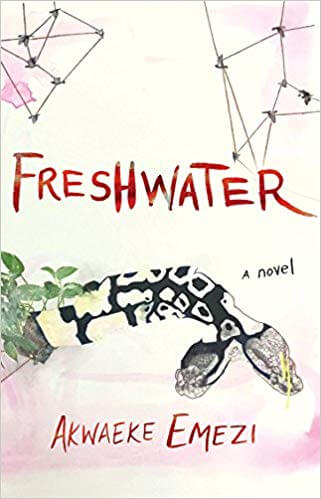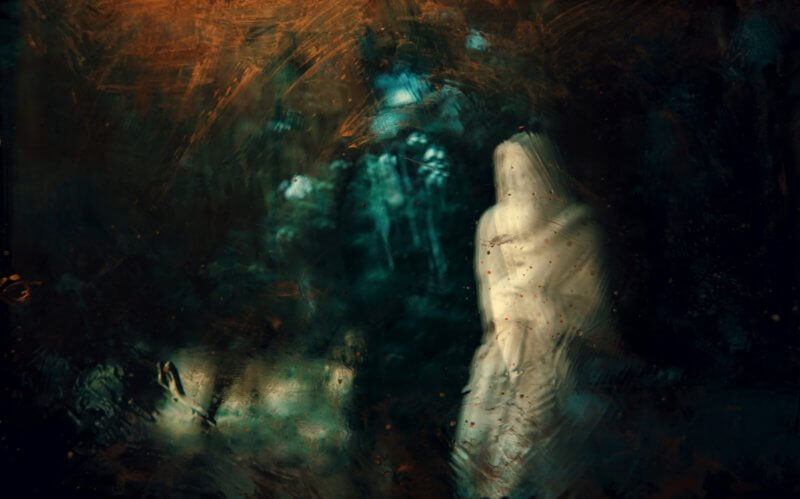
Last year in May, I was on a book buying spree to discover some new authors and themes in writing. That’s when I came across Freshwater by Akwaeke Emezi. The book has a gorgeous cover of a fishtail, but now that I am looking closely, it could even be a two-headed python. The story is about a girl, Ada, born in southern Nigeria, who is believed to be born “with one foot on the other side”. A traumatic experience breaks the voices in her head into separate selves and Ada seems to fade away into the confines of her mind to deal with her life. She gives control to her other selves that promise to take care of her and never let something like the past happen ever again. As the reader, we follow Ada’s struggles, mostly through the lens of her other selves and sometimes through her own voice.
This book is about multiple personalities, identity, religion, faith and mental health. It is rooted in the Nigeria culture and their beliefs about multiple selves and how they come to be. What I found fascinating in the book, was that the way it is written, it allows Akwaeke to talk about humanity and the things that we, humans, do from the perspective of another type of being, the ogbanje, the spirits that reside in her. Most of it is narrated in a first person plural (we) form and that is intriguing in itself – made me wonder and hunt for the answer to how many selves Ada truly had.
The Main Character: Ada
Ada was born out of a prayer from her parents. She is different from other children because she has spirits, known as the obganje, inside her. The story is mostly narrated by these spirits together and depicts her journey from an infant, talking about who they are, what it means for a human to have them inside and how they affect Ada. Collectively, they always refer to her as ‘the Ada’ because they know and come from the god that answered her parents’ prayer. However, their presence in her isn’t necessarily a good thing at all.
The main problem was that we were a distinct we instead of being fully and just her.
Pg 5
Commentaries in Freshwater
On Multiple Identities
Ada has ogbanje within her and we meet some of these ogbanje as we learn more about her journey, the primary one being Asughara who emerges after a traumatic incident during Ada’s university years. From a young age, Ada had come to realize that she was not alone. However, she had always had control over herself, no matter how out of control she felt. The nerve wrecking incident leads her to bring forth one of her ogbanje, Asughara, who promises to protect her from bad things. There are times when Ada gives complete control over to Asughara and her other identities. Her memory thus becomes divided into sections – things that happened to her and things that happened to her other selves. However, this course of action causes identity crisis.
The Ada could look back on her life and see, like clones, several of her standing there in a line. This terrified her, because if there were so many of her, then which one was she?
Pg 209

Dissociative identity disorder, previously known as multiple personality disorder, is when a person exhibits at least two identities who have distinct personalities and memories. The causes of this disorder are many and varied, however, histories of childhood trauma such as abuse and war seem to be present in most cases.
Freshwater gives us a deep dive into the many selves that Ada has, collectively and individually, as well as the changes that each causes in her. It also explores Ada’s attempt at feeling sane and one. Ultimately, Ada has to come to accept that she has many selves and they are all her, while dealing with feelings of helplessness and madness.
The world in my head has been far more real than the one outside – maybe that’s the exact definition of madness come to think of it all.
Pg 93
The way Akwaeka uses the obganje to portray multiple personalities is nothing like I have ever read before. It is one thing to hear about people who go through these things, and altogether another thing to read about how one experiences it. Since this is an autobiographical novel, this narrative makes even more impact. Getting a glimpse into Ada’s head, as well as an outsider’s lens on who she is, takes some adjustment but is totally worth it!
An example
We all have multiple identities, whether it is where we were born, what religion we practice, the profession we work in or the inteFreshrests that we follow in our own time. These are all pieces of us and we seamlessly transition from one role into the other when need be. However, sometimes, something happens that makes us wonder why we acted a certain way.
For example, there is an outdoor cat that visits my cat and causes a lot of distress in our home. Since he usually visits at night, I wake up screaming from my cat’s distress calls. Recently, I have been thinking about this reaction and what happens in this situation. I wonder if this shift in behavior and the protectiveness that comes over me is almost another self. I don’t loose any memories though so it is still me. But it is this outside view of my actions which make me relate to Ada a little bit more.
On Origins and Religion

Ada is the child of Ala, a deity in the Igbo Nigerian culture who rules the underworld and holds the ogbanje in her belly. She takes the form of a python.
All freshwater ones out of the mouth of a python… Before a christ-induced amnesia struck the humans, it was well known that the python was scared, beyond reptile. It is the source of the stream, the flesh form of the god Ala, who is the earth herself, the judge and mother, the giver of law…. For the egg of a python is the child of Ala and the child of Ala is not, and can never be, intended for your hands.
Pg 9
The ogbanje, talk about the religious beliefs of Ada’s family and give further insight into the Christ. In their culture, Christ’s real name is Yshwa, and he was born in a way similar to Ada. Since Ada worships him, his presence/non-presence is a subject that often comes up in the novel. Of particular interest is how Ada’s faith changes after her traumatic incident that leads to the birth of Asughara and the views Asughara holds about the Christ. This commentary on the Christ and what the old gods or ancestors think about him is quite interesting to read.
Stories about old gods, such as the Norse Gods, and the mythology around them is another one of those topics that I love reading about. Akwaeke does a good job of introducing the reader to their folklore. However, for someone who has little knowledge about their culture, the true meaning of many of short texts under chapter headings is lost. I would have appreciated a little more background knowledge about the legends in an appendix or even a list of pronunciations for the words would have been nice to have.
On Humanity
The ogbanje serve as a tool to give an outside perspective on the things that humans do. The wishes we make, the things we forget, the things we name into existence are all acts that we carelessly indulge in without thinking about the consequences.
Humans often pray and forget what their mouths can do, forget that every ear is listening, that when you direct your longing to the gods, they can take it personally.
Pg 7
They also comment about the short-term memory that we have, whether it is the things that happen to us or the collective memory of our ancestors. Unlike the ogbanje, who are dead souls know everything from their past, humans do not have the luxury of this knowing.
Important things slip past in the moment, when it feels sharp and they [humans] are young enough to think that the feeling will remain.
Pg 20
Human bodies are ultimately just vessels that the ogbanje use to interact with the world and yet, they are weak vessels because they cannot withstand the might of these gods.
Final Verdict
I really enjoyed reading this book. It is one of a kind, with engaging storytelling and a psychotic element. This is an autobiography, which is mind-blowing, considering the themes that it addresses and the path the story takes. It is books like this one that give a glimpse into the diversity of theological beliefs around the world.
A raw and honest narrative that begs us to take a look into the depths of our mind, at the multiple identities we all keep within us.
Of my suggestions under some of the themes, another way the narrative could have enhanced would have been to read more by Ada herself, to distinctly see the difference between her thinking and her other selves. Overall though, for the thoughts that this book led me on and the topics that it peaked my curiosity about, it was a very good read.
If you get a chance to read it, let me know what you think of it.
Similar Books That are now on my To-read list
If there are other books that you know are along similar themes, do share.

loved this book. :] just wanted to comment that Akwaeke is not a woman and uses pronouns they/them/their.
Thank you for your note. I have updated the pronouns where I think they were used.